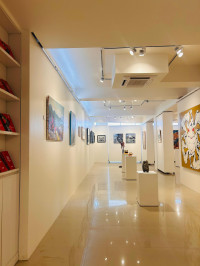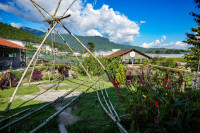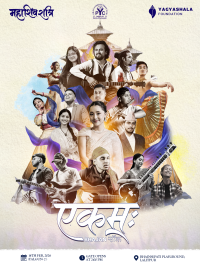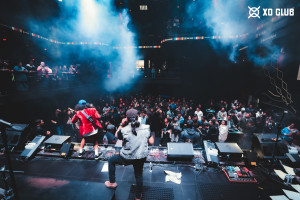Culture & Lifestyle
Turning public spaces into stages, theatre artists carry on despite pandemic
In the gloom of the pandemic and rising corruption and crimes, theatre artists are taking on the responsibility of voicing social issues through their performances.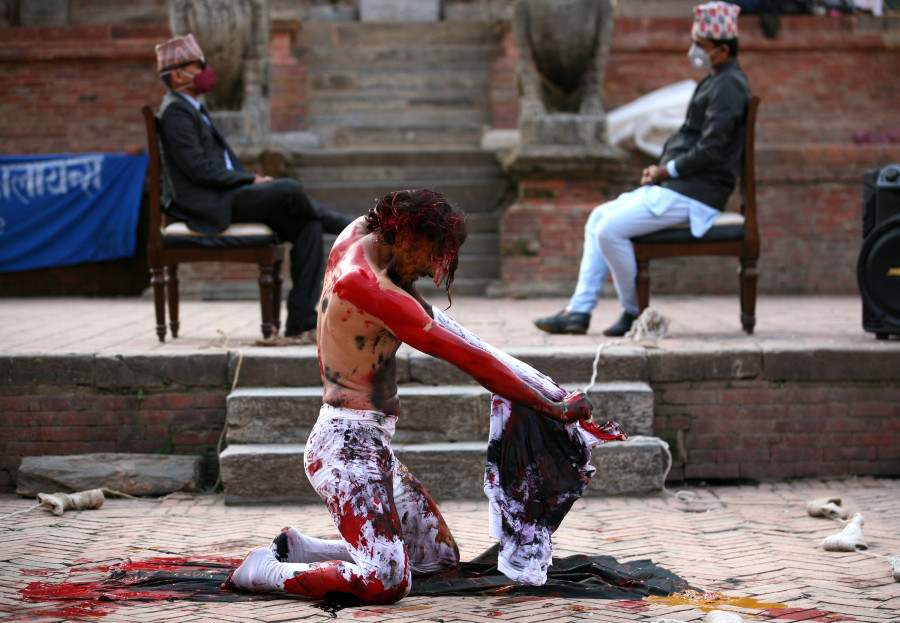
Srizu Bajracharya
When an artist performs with all their conviction, even a bystander is urged to stop and listen carefully. And that was what happened recently when Yubaraj Ghimire performed his poem Aslil Satta, which can be translated into ‘filthy politics’ in English, in the bustling Patan Durbar Square to show solidarity with Dr Govinda KC’s campaign.
Dressed in white, Ghimire painted himself in red and black colours to show the pain of a man living through a chaotic pandemic—one that has left many on empty stomachs—while the two central government figures scuffled over their politics. His performance pointed the government’s blind eye to the incidences of rape happening in the country every day, the inequality that the pandemic has exposed, and the corrupted government systems that have failed to provide proper health care to people.
Ghimire’s performance left an impression, even more so in the end when he skinned off his clothes and asked: Who is abhorrent, you or I?
It has been more than 200 days since the pandemic forced theatres across the country to shut operations. And the hope of them resuming any time soon is still far from sight. But for theatre artists like Ghimire, performing their art has never been more important—despite the anxiety and the financial distress the pandemic has imposed on them. For them, these difficult times are crucial to impact people’s lives with conversations that have for long been shelved. Today, he and many other theatre artists are staging open-air plays to make louder the concerns of people in these times of fear and strained emotions.
“We can’t wait for things to get better and then to jump into action. I believe this is just the time for us to make an impact and touch people’s lives because there is so much happening right now, and we need to address for these issues now, not just as an artist but also as a citizen,” said Ghimire, who is also the artistic director of Shilpee Theatre.
“Even though this has been a difficult time for theatre, I believe that as artists we need to keep doing our part to keep theatre alive,” said Pabitra Khadka, another theatre artist at Shilpee Theatre. Khadka has also performed in Patan Durbar Square, as a pregnant woman asking for help in the skit Abhibhawak Bihin Janta to represent the story of pregnant women in the country who have died because they couldn’t avail of proper health care at the right time. Her performance also symbolically represented the stories of women who have been raped and abused while society has remained indifferent to their torment and hardship.
Khadka started theatre by playing roles in public dramas and so for her, theatre has always been tied to the social reality of communities.
“As a theatre artist, I feel more obliged to speak about social issues and inspire social change. Years back, I was inspired by dramas because they so beautifully captured my emotions and represented stories of our communities,” she said.
Over the years, Shilpee Theatre has staged many public dramas in the form of forum theatre, where the artists explore solutions for social issues with the audience through their performance. “Through our public skits, we usually try to interact with the audience then just presenting them an act. We usually urge them to speak for the issues that we bring to them,” said Khadka.
Today, although artists in Shilpee theatre miss the creative environment in which they worked before the pandemic, their team have stealthily worked to repurpose themselves now. These days, they virtually meet to discuss recent social issues to improvise and to work on public skits that can engage people to respond to the wrongs happening in our society. They don’t worry about not having an audience to perform for, instead, they prepare and rehearse to perform where there already are audiences.
“For both our previous dramas we chose Patan Durbar Square because we wanted to perform in a place where people are comfortable being in the public,” said Ghimire. “It was a place where we could comfortably intervene. But in the future, we plan to take our plays to more diverse audiences to propel conversations around gender, caste, class and the violence happening in our society,” he said.
Similarly, on June 30, a group of artists from Katha Ghera, a theatre group in support of the Enough is Enough campaigners who were on hunger strike, also presented a street performance ‘Hachhyu Sachhyu’, showcasing the plight of quarantine centres in the country and the stigma of the virus that has divided people. It also pressed on violence and caste-based discrimination in these centres and the inefficiency of the government in dealing with the pandemic.
“When we made an open call for artists to perform at Patan, we didn’t think people would be ready to participate but we had an overwhelming response and they were all eager to do something; they were passionate and despite their own struggles gave their best,” said Akanchha Karki, director of Kausi Theatre, who leads the theatre group Katha Ghera.
However, financial distress has dissuaded them from organising open air plays, as they require a certain budget to bring the show together.
“But right now, many of us are also struggling with our sense of purpose. There’s a void we can’t explain, as our theatres are still closed for the audience and the current environment challenges us in so many ways,” she said.
“Plus there is no alternative for theatre; the alternative of theatre can only be theatre,” she said.
Even if theatre were to go online, that would only be a temporary solution, said Karki. “Then the whole artform becomes different,” she said. For theatre artists and for people, theatre is special because people are experiencing the story with the actors performing at the same time. They live and breathe in the same space of the art. “There is no screen in between the actors and the audience; there is no wall preventing people from engaging,” said Karki.
But despite being in such a difficult situation, artists are making sure they contribute to society creatively. Shilpee has focused entirely on taking theatre to people to speak for the people’s concerns and to create meaningful conversations that can bring about social changes. “We are preparing to stage ‘Isolation’, a skit performance mirroring the current pandemic. We hope that will help us overcome the fear and anxiety that overwhelms us today,” said Ghimire.
Meanwhile, Katha Ghera has been growing a theatre community with their playback theatre online programme, where artists spontaneously portray stories and feelings of participants in a virtual group. The activity is a continuation of their pre-pandemic performances where they engaged with the audience to build connections and learned to empathise and be aware of people's emotions.
“Continuing with that activity online has helped us build a community. It is a very intimate setting, where people from different parts of the country participate,” said Karki.
But while some theatre artists and theatres continue to put their effort to keep the theatre world thriving in this time, artists and creators know that even after the pandemic, the theatre world will still have many challenges to overcome. And that truth has not been undermined by this crisis. “We are still largely misunderstood. The government doesn’t see us as part of art and culture; they see us as mere entertainers, and that reflects on the budget they allocate for our development. They still fail to see how theatre impacts society and our culture,” said Ghimire.
Under the gloom of a virus-stricken world, with no audience and no tickets sold, there is no brighter side for theatre creators and artists to look forward to. Yet, they are hopeful that theatre will return again. For now, they are content with doing their part in making a better society.
“We are as keen as before, perhaps, even more now, to perform people’s feelings and sentiments as a form of their catharsis,” said Ghimire. “It’s a moment we cannot miss doing anything; it’s a time when we can really make an impact.”




 12.12°C Kathmandu
12.12°C Kathmandu

